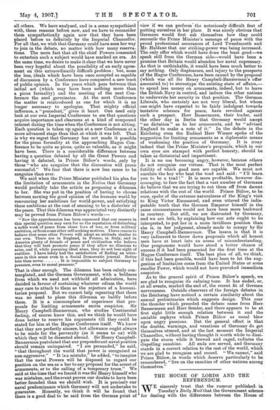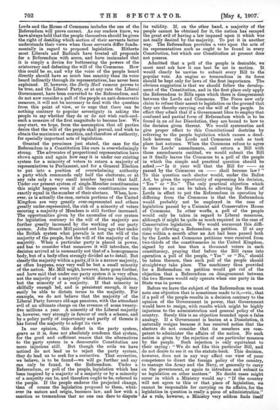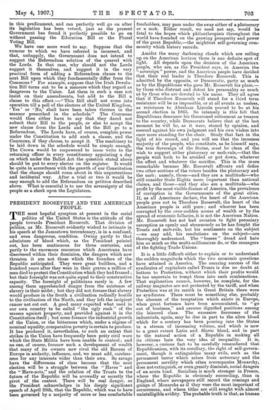THE HOUSE OF LORDS AND THE REFERENDUM.
WE sincerely trust that the rumour published, in Tuesday's Daily Mail that the Government scheme, for dealing with the differences between the House of
Lords and the House of Commons includes the use of the Referendum will prove correct. As our readers know, we have always held that the people themselves should be given the right of deciding which section of their servants better understands their views when those servants differ funda- mentally in regard to proposed legislation. Hitherto most Liberals and Radicals have treated all proposals for a Referendum with scorn, and have insinuated that it is simply a device for buttressing the powers of the aristocracy and defeating the will of the Commons. How this could be so, and why the voice of the people heard directly should have so ranch less sanctity than its voice heard indirectly through its representatives, has never been explained. If, however, the Daily Mail rumour proves to be true, and the Liberal Party, or at any rate the Liberal Government, have been converted to the Referendum, and do not now consider a poll of the people an anti-democratic measure, it will not be necessary to deal with the question from this point of view, or to urge that there can be nothing contrary to popular sovereignty in asking the people to say whether they do or do not wish such-and- such a measure of the first magnitude to become law. We may start, we hope, from the assumption that all parties desire that the will of the people shall prevail, and wish to obtain the maximum of sanction, and therefore of authority, for specially important acts of legislation.
Granted the premisses just stated, the case for the Referendum in a Constitution like ours is overwhelmingly strong. The advocates of proportional representation have shown again and again how easy it is under our existing system for a minority of voters to return a majority of representatives to Parliament, and for a. General Election to put into a position of overwhelming authority a party which commands only half the electorate, or at any rate only a very small number beyond that half. Under our present system of single-Member constituencies this might happen even if all those constituencies were exactly equal in the number of their electors. When, how- ever, as is actually the case, certain portions of the United Kingdom are very greatly over-represented and others greatly under-represented, the risk of a minority of voters securing a majority of Members is still further increased. The opportunities given by the anomalies of our system for legislation contrary to the will of the majority are further greatly increased by the working of our party system. John Stuart Mill pointed out long ago that under the British system what prevails is not the will of the majority of the people, but the will of the majority of the majority. When a particular party is placed in power, and has to consider what measures it will introduce, the decision arrived at is necessarily not that of a homogeneous. body, but of a body often strongly divided as to detail. But clearlythe majority within a party,if it is a narrow majority, as often happens, may very well be but a small minority of the nation. Mr. Mill might, however, have gone further, and have said that under our party system it is very often not the majority of a majority which dictates legislation, but the minority of a majority. If that minority is skilfully enough led, and is persistent enough, it may easily be able to dictate terms to the majority. For example, we do not believe that the majority of the Liberal Party favours old-age pensions, with the attendant evil of an ultimate charge on the revenue of some twenty- five millions a year. A minority of the Liberal majority is, however, very strongly in favour of such a scheme, and by a policy partly of importunity and partly of threats it has forced the majority to adopt its view.
In our opinion, this defect in the party system, grave as it is, does not absolutely condemn that system, for the good and sufficient reason that the alternatives to the party system in a democratic Constitution are more injurious still. But though the evils we have noticed do not lead us to reject the party system, they do lead us to seek for a corrective. That corrective, we believe, is to be found—we will go further and say can only be found, in the Referendum. Under a Referendum, or poll of the people, legislation which has been inspired by a majority of a majority or by a minority of a majority can be, and therefore ought to be, referred to the people. If the people endorse the projected change, then of course the legislation proposed to them, what- ever its nature and origin, becomes law, and law with a sanction so tremendous that no one can dare to dispute
its validity. If, on the other hand, a majority of the' people cannot be obtained for it, the nation has escaped the great evil of having a law imposed upon it which was not really desired by the majority. To put it in another, way. The Referendum provides a veto upon the acts of its representatives such as ought to be found in every Constitution, but which our Constitution at present does not possess.
Admitted that a poll of the people is desirable, we must next ask how it can best be set in motion. It
would clearly be unwise to submit every Bill to the popular vote. An engine so tremendous in its force, should be kept only for laws of the first importance. The obvious suggestion is that we should follow the develop- ment of the Constitution, and in the first place only apply the Referendum to Bills upon which there is disagreement between the Lords and Commons. The Peers now only claim to refuse their assent to legislation on the ground that they are thereby carrying out the will of the people. In effect they admit that if a Government likes to employ that confused and partial form of Referendum which is to be found in an ad hoc Dissolution, they are bound to bow to the decision given thereat. We would systematise and give proper effect to this Constitutional doctrine by referring to the people legislation which causes a dead- lock between the Lords and Commons such as took place last autumn. When the Commons refuse to agree to the Lords' amendments, and return a Bill with those amendments omitted, we would submit the Bill as it finally leaves the Commons to a poll of the people in which the simple and practical question should be asked. :—" Is it your will that the Bill for — as passed by the Commons on — shall become law? To this question each elector would, under the Ballot Act, be given the opportunity of expressing his decision, " Yes " or " No." The only practical objection which it seems to us can be taken, to allowing the House of Lords in effect to put the Referendum in operation by differing from the Commons is that the Referendum would probably not be employed in the case of legislation passed by a Unionist and Conservative House of Commons. In other words, a poll of the people would only be taken in regard to Liberal measures, although it might be quite as much required in the case of Conservative legislation. We would surmount this _diffi- culty by allowing a Referendum on petition. If at any time within a month after an Act had been passed both by the Lords and Commons petitions were received from two-thirds of the constituencies in the United Kingdom, signed by not less than a thousand voters in each constituency, praying that before the Bill came into operation a poll of the people, " Yes " or " No," should be taken thereon, then such poll of the people should straightway take place. The machinery thus provided for a Referendum on petition would get rid of the objection that a Referendum on disagreement between the two Houses would only operate when one party in the State was in power.
Before we leave the subject of the Referendum we must note one objection that is sometimes made to it,—viz., that if a poll of the people results in a decision contrary to the opinion of the Government in power, that Government would have to resign, with results which might be highly injurious to the administration and general policy of the country. Surely this is an objection founded upon a false analogy. If a Government is beaten at a Dissolution, it naturally resigns because it has received notice that the electors do not consider that its members are com- petent to administer the affairs of the nation. No such notice is given by the rejection of one particular measure by the people. Such rejection is only equivalent to their saying : " We do not like this particular Bill, and do not desire to see it on the statute-book. This decision, however, does not in any way affect our view of your competence to direct the foreign policy of the country, to manage the Army and the Navy, or generally to carry on the government, or again to introduce and submit to us legislation on other matters." No doubt cases might occur in which a Ministry would say : "If the country will not agree to this or that piece of legislation, we cannot be responsible for carrying on its affairs, for the legislation in question is really a piece of administration." As a rule, however, a Ministry very seldom finds itself
in this predicament, and can perfectly well go on after its legislation has been vetoed, just as the present Government has found it perfectly possible to go on without passing the Education Bill or the Plural Voting Bill.
We have one more word to say. Suppose that the rumour to which we have referred is incorrect; and that, unhappily, the Government does not intend to suggest the Referendum solution of the quarrel with the Lords. In that case, why should not the Lords suggest it themselves, and suggest it in the very practical form of adding a Referendum clause to the next Bill upon which they fundamentally differ from the Commons ? For example, suppose that the Irish Devolu- tion Bill turns out to be a measure which they regard as dangerous to the Union. Let them in such a case not insist on their amendments, but add to the Bill a clause to this effect This Bill shall not come into operation till a poll of the electors of the United Kingdom, ' Yes ' or 'No,' shall have been taken thereon in the manner prescribed in the schedule." The Commons would then either have to say that they dared not submit their Bill to the people, or else to accept the new clause from the Lords and let the Bill go to a Referendum. The Lords have, of course, complete power under the Constitution to add such a clause, and the Commons, if they choose, to accept it. The machinery to be laid down in the schedule would be simple enough. The Crown would be empowered to issue writs to the returning officer in every constituency appointing a day on which under the Ballot Act the question stated above should be put to every elector on the register. It would be quite in accordance with the growth of our Constitution that the change should come about in this unpretentious and incidental way. After a trial or two it would be easy enough to add the Referendum on petition described above. What is essential is to use the sovereignty of the people as a check upon the Legislature.
















































 Previous page
Previous page